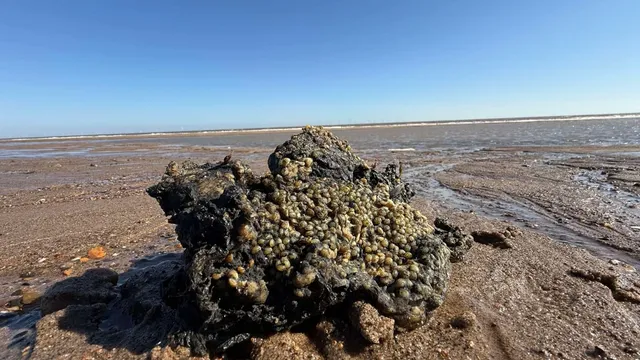
Plastic pellets spill endangers seabirds after ship collision
2025-03-20 17:23- A collision between the Solong container ship and the Stena Immaculate oil tanker released billions of plastic pellets onto beaches.
- Environmental groups warn of the immediate threat to seabirds and marine life due to these nurdles, which can become part of the food chain.
- Efforts to clean up the nurdles are urgent as rising tides threaten to spread them further and hinder recovery efforts.
Express your sentiment!
Insights
On March 10, 2025, a maritime accident involving the Solong container ship and the Stena Immaculate oil tanker resulted in a significant spill of plastic resin pellets, known as nurdles, along England's east coast. The crash occurred in the North Sea, causing both vessels to catch fire due to several explosions. The incident led to the rescue of 36 crew members, though tragically, one man lost his life. The captain of the cargo ship was arrested and charged with gross negligence manslaughter related to the collision, marking a serious legal implication stemming from this environmental disaster. Environmental organizations have raised alarms about the nurdles, which have begun washing ashore on beaches in Norfolk and Lincolnshire. These pellets, which are approximately the size of lentils and potentially mistaken by seabirds for fish eggs, present a critical threat to local wildlife as they could choke or starve from ingesting them. Additionally, there is concern that other pollutants attached to the nurdles could further jeopardize marine ecosystems. In particular, the East Coast Wetlands, a key migration and feeding area for various bird species, is deemed at risk. Local wildlife experts and conservationists stress the urgency of clean-up operations, warning that rising tides could disperse the pellets even further, making them increasingly difficult to recover. Volunteers and clean-up teams are mobilizing in a race against time to gather the spilled plastic debris before it can negatively impact the food chain. The presence of nurdles along beaches not only illustrates the consequences of maritime accidents but also highlights the broader issue of plastic pollution in our oceans and coastal regions. FIDRA, an environmental charity combating plastic waste, has observed the widespread impact of nurdle pollution, emphasizing that not just large spills, but everyday handling also contributes to this environmental crisis. The charity underscores the necessity for better regulations in the plastic supply chain to prevent similar leaks in the future, as the production of plastic often sees a staggering volume of pellets lost globally each year. Raising awareness about the dangers of nurdles and their detrimental effects on wildlife and ecosystems is paramount to prevent this issue from escalating.
Contexts
Nurdles, small plastic pellets used in the production of plastic products, have emerged as a significant environmental concern due to their widespread presence in marine and terrestrial ecosystems. These substances are primarily sourced from plastic manufacturing facilities, where they are produced and transported in bulk. Nurdles can escape the production and transportation processes through spills, overflow, and inadequate waste management, leading to their accumulation in waterways and ocean environments. They serve as transport vehicles for hazardous chemicals, which may adhere to their surfaces, posing risks to wildlife and potentially entering the food chain. Furthermore, the small size and buoyancy of nurdles make them particularly challenging to clean up once they enter the environment, leading to an increase in their prevalence in contaminated areas. The need for comprehensive regulations surrounding nurdles is evident, considering their persistent and insidious impact on ecosystems. Regulatory efforts to address the issue of nurdles have been initiated in various regions, with an emphasis on preventing their release during manufacturing and transportation. For example, several countries have developed guidelines and best practices for the plastic industry to minimize spills and manage waste effectively. However, regulation on nurdles remains inconsistent across the globe; while some jurisdictions have implemented stringent controls, in others, lax regulations allow for continued environmental contamination. The challenge lies in creating a cohesive regulatory framework that not only holds manufacturers accountable for their production and transport practices but also enables effective monitoring and enforcement mechanisms. Collaborations among governments, industries, and environmental organizations are crucial to develop effective strategies that can significantly reduce nurdle pollution. Public awareness campaigns are another vital component of addressing the nurdle crisis. By educating consumers about the origins and environmental impacts of nurdles, individuals can make informed decisions and advocate for policy changes. Citizen science initiatives can further empower communities to monitor local nurdle pollution and participate in cleanup efforts. Through these actions, individuals can contribute to a broader cultural shift regarding plastic use and disposal. Moreover, advocacy for more sustainable materials and alternatives to plastic can play an essential role in minimizing the demand for nurdles, thereby reducing their prevalence in the environment. In conclusion, nurdles represent a complex environmental challenge that requires a multifaceted approach to regulation, public engagement, and sustainable practices. The ongoing balance between plastic production and its ecological impacts calls for immediate action from all stakeholders, including manufacturers, policymakers, and consumers. Effective regulation, combined with increased public awareness and engagement, can help mitigate the issue of nurdles and protect our ecosystems for future generations.